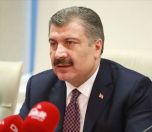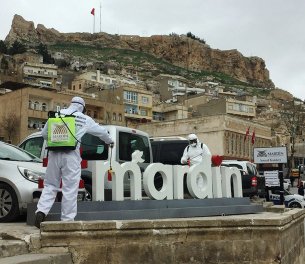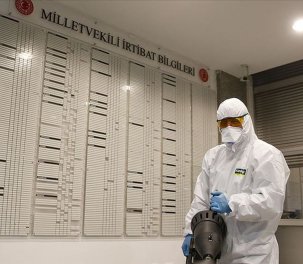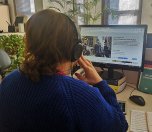Turkey Confirms Fifth Coronavirus Case, Suspends Flights with European Countries

Photo and source: AA
Click to read the article in Turkish
Turkey has confirmed three more Covid-19 cases, raising the tally to five.
"After our first two cases, we confirmed three new cases who came into contact with them and were from the same family. All five cases are directly related," said Health Minister Fahrettin Koca in a news conference in the capital Ankara.
Two of the patients have difficulty in breathing, Koca added.
Turkey banned flights to 14 countries as part of measures to stem the coronavirus outbreak, he announced.
CLICK - Ministry's Science Committee Doesn't Expect Major Coronavirus Outbreak in Turkey
The minister also reminded that citizens of Turkey who visit foreign countries will have to take 14 days off from work and spend the time in self-isolation as of Monday.
Pregnant women and women on breast-feeding leave, people with disabilities and older than 60, except managers, will be allowed 12 days off from work and spend the time in self-isolation as of Monday, Koca further noted.
Visitors to hospitals will only be allowed after working hours and those visits too will be limited, the health minister said.
Flights to and from 10 European countries suspended
Addressing reporters alongside Koca, Transport and Infrastructure Minister Cahit Turhan said Turkey has added nine more European countries, namely Germany, France, Spain, Norway, Denmark, Belgium, Austria, Sweden and the Netherlands, in its list of flights suspended.
Flights from these countries will be suspended as of 08.00 a.m. (05.00 GMT) on Saturday, until April 17, Turhan said.
World Health Organization (WHO) earlier stated that Europe is the new epicenter of the outbreak.
Previously, Turkey suspended flights from China, Iran, Iraq, Italy, and South Korea.
The ministry is working for the disinfection of public transportation vehicles to prevent the spread of the COVID-19.
After emerging in Wuhan, China last December, the virus has spread to at least 123 countries and territories.
The global death toll is now nearly 5,000, with more than 132,500 confirmed cases, according to the World Health Organization, which declared the outbreak a pandemic.
A vast majority of those who become infected recover from the illness.
Interactive map of the coronavirus outbreakSource: Washington University |
How to protect from the new Coronavirus? |
|
According to the World Health Organization (WHO), the protective measures against the new coronavirus (Covid-19) can be briefly listed as follows: Wash your hands frequently Regularly and thoroughly clean your hands with an alcohol-based hand rub or wash them with soap and water. Why? Washing your hands with soap and water or using alcohol-based hand rub kills viruses that may be on your hands. Maintain social distancing Maintain at least 1 metre (3 feet) distance between yourself and anyone who is coughing or sneezing. Why? When someone coughs or sneezes they spray small liquid droplets from their nose or mouth which may contain virus. If you are too close, you can breathe in the droplets, including the COVID-19 virus if the person coughing has the disease. Avoid touching eyes, nose and mouth Why? Hands touch many surfaces and can pick up viruses. Once contaminated, hands can transfer the virus to your eyes, nose or mouth. From there, the virus can enter your body and can make you sick. Practice respiratory hygiene Make sure you, and the people around you, follow good respiratory hygiene. This means covering your mouth and nose with your bent elbow or tissue when you cough or sneeze. Then dispose of the used tissue immediately. Why? Droplets spread virus. By following good respiratory hygiene you protect the people around you from viruses such as cold, flu and COVID-19. If you have fever, cough and difficulty breathing, seek medical care early Why? National and local authorities will have the most up to date information on the situation in your area. Calling in advance will allow your health care provider to quickly direct you to the right health facility. This will also protect you and help prevent spread of viruses and other infections. |
(EKN/VK)








